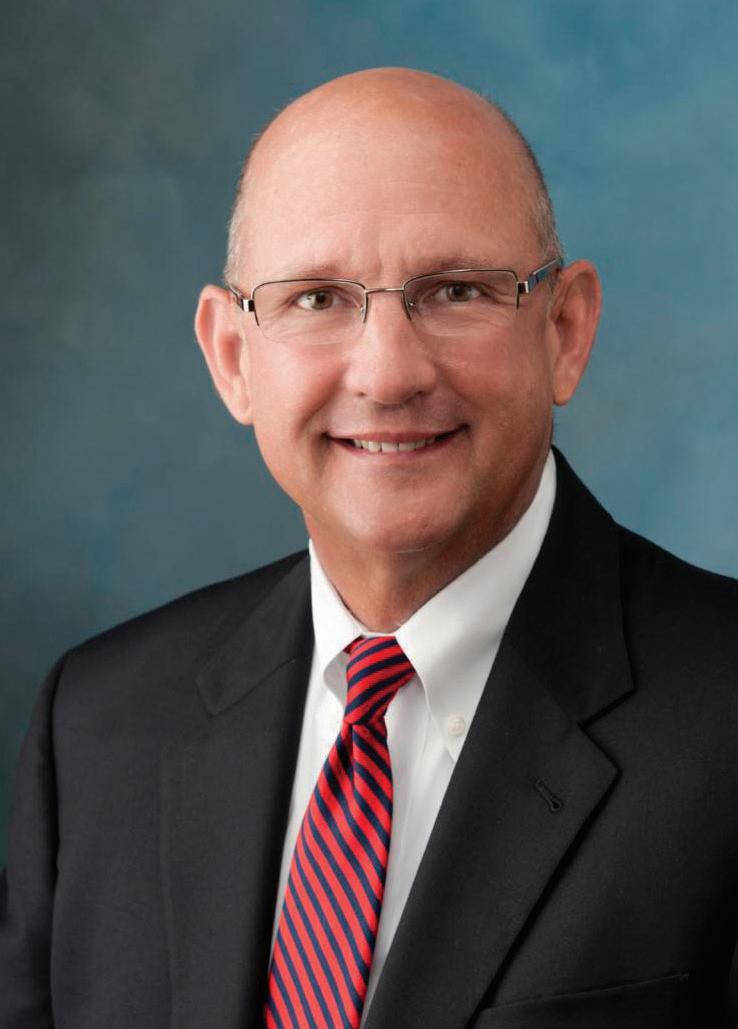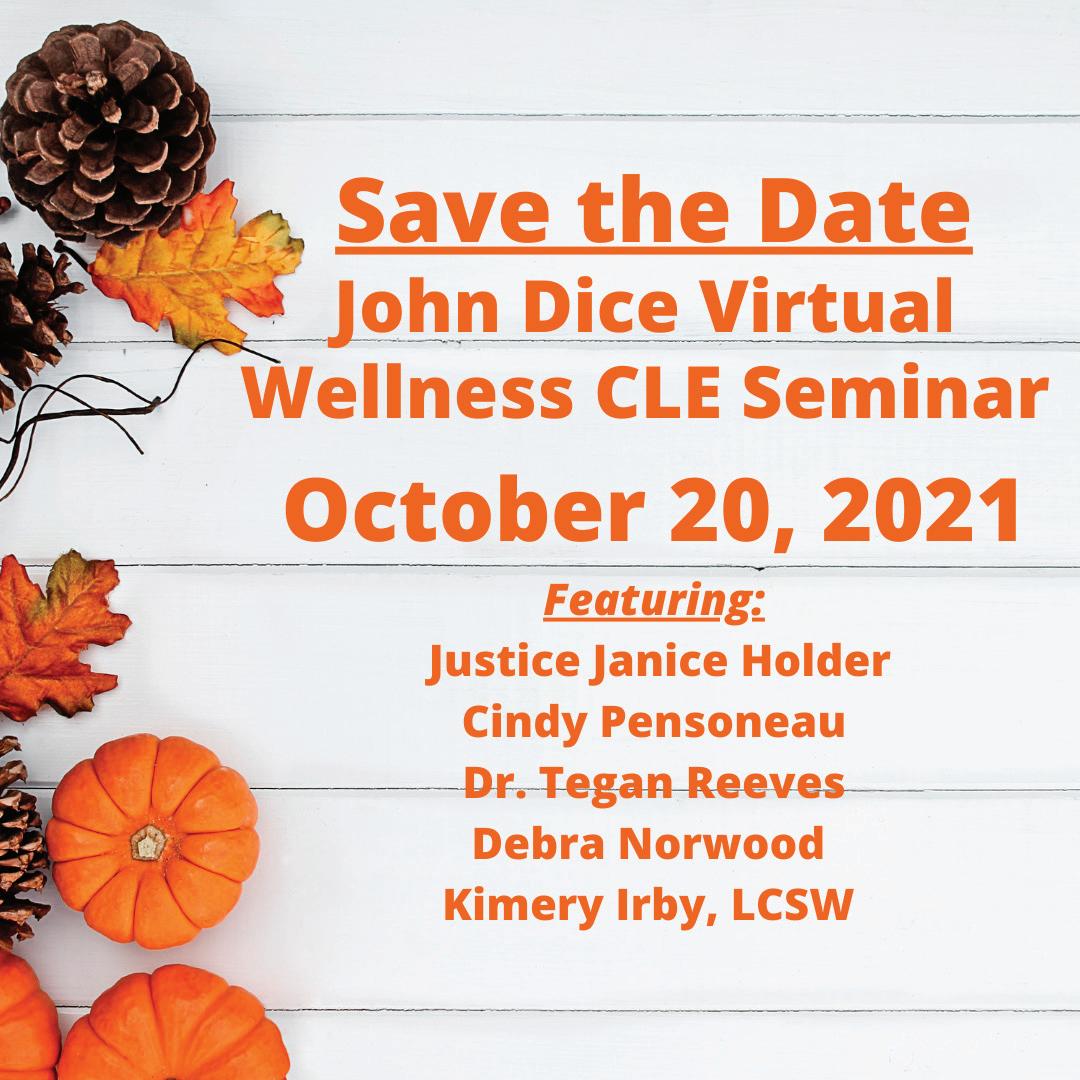
6 minute read
Post COVID: Rebuilding Health, Hope, and Opportunity
Post COVID:
Rebuilding Health, Hope, and Opportunity
By BUDDY STOCKWELL, Executive Director, Tennessee Lawyers Assistance Program
The year of 2020 has truly tested our mettle. It is not often that a disaster affects literally everyone in the world at least to some degree. All of us have suffered consequences from the COVID 19 Pandemic within a spectrum of damages ranging from death of family or friends at worst, to changes in employment, major inconveniences, distractions, isolation, and fears of uncertainty at best.
Now, as we get vaccinated and finally begin to emerge from quarantine and the peak of the COVID crisis, there remains a serious level of uncertainty about how badly we have been damaged individually and as a profession. What does the future hold and what will our lives look like going forward?
As for me personally, I’m new to Tennessee. I was hired as the new Executive Director of Tennessee Lawyers Assistance Program (TLAP) last year and I moved to Tennessee in July of 2020, during the height of the Pandemic. I came from South Louisiana where I was the Director of Louisiana’s Judges and Lawyers Assistance Program for the last decade (and peer monitor and volunteer there since 1993).
Now, halfway into my 39th year of sobriety from alcoholism, my entire legal career (law school at LSU, practicing law in Baton Rouge, and as LAP director in Louisiana and now Tennessee) has been accomplished while in continuous recovery from alcoholism. I have had a stunningly rewarding and interesting life in recovery, and I would not change a thing. I am very grateful to have enjoyed long term remission from a disease that tried its most powerful best to kill me.
In addition to surviving alcoholism, I have also survived many hurricanes, going all the way back to Betsy in 1965 and the infamous Camille in 1969. I was nine years old when the eye of Betsy and the brunt of the storm passed over and shook our little house to its foundation in the ink-black night. Of course, everyone knows about Katrina in 2005, which was not the strongest to ever hit, but tested and breached the levee systems in New Orleans killing 81 people and causing well over one billion dollars in damages.
The most devastating impact of Katrina: severe mental health damages to those who lost everything they owned, with many shipped off to other cities and forced to start a new life. Incidents of suicide, depression, substance use disorders, and trauma-related disorders overwhelmed mental health resources in Louisiana. It was a perfect storm for an epic mental health crisis.
Emotionally, and from a mental health standpoint, the COVID Pandemic feels the same to me, except it is happening on a global scale. Of course, after any storm, we can clear the highways, restore the powerlines, and clean up the debris in our yards. But the mental health damage is much harder to clearly identify, assess, and address because stigma and other barriers often block a person’s ability to admit, much less seek, the mental health help that they need.
As for the legal profession and Lawyers Assistance Programs across the nation, we were all on high alert as the Pandemic took hold in the spring of 2020. As the isolation and fear of being quarantined in an
unprecedented crisis ramped up, we braced ourselves for an anticipated tsunami of confidential calls for help from lawyers and judges experiencing serious anxiety, depression, or problematic alcohol or substance use due to the stressors of the Pandemic. But to our total surprise, the opposite happened. Many LAPs reported a steep decline in calls for help, with some reporting an unprecedented and eerie “radio silence.” We now also know that alcohol sales were concurrently spiking during the Pandemic. One envisions a significant number of folks now at high risk due to implementing a coping strategy of increasing their alcohol use while in isolation due to working remotely.
In the meantime, the message on best practices selfcare during this Pandemic remains the same. To stay resilient and healthy means putting self-care first. Take media breaks and make sure you do not spend too many uninterrupted hours looking at computer, cellphone, and television screens. Get outside often, even if only in your backyard. It is important to turn off our “lawyer brains” and simply experience and appreciate the present moment. Meditation, mindfulness, yoga, or even taking a 15-minute walk in the morning and afternoon can render significant benefits. And, of course, we all know that exercise and diet matter. Staying connected with family and friends is also paramount. Mental health issues are always worsened by isolation. All these things are ingredients for the ultimate goal: developing and maintaining a positive “attitude of gratitude” that promotes health, hope, and opportunity even in times of adversity. The mission is not simply to survive but instead to thrive in the wake of COVID 19.
To that end, as I write this article, I find myself excited and optimistic. I am extremely grateful because I did not contract COVID 19, and I am now vaccinated. In the last week, yet another positive milestone: I travelled for business for the first time in a year, stayed in a hotel, and even conducted an in-person presentation to lawyers and judges who were not wearing masks because the mask mandate had finally been lifted. It was not until appearing at that in-person face-to-face event that I fully realized just how personally painful the isolation of the Pandemic has been. This was not an intellectual or analytical realization. Rather, soon after entering the room full of unmasked people and seeing their smiling faces, I experienced an uncontrolled and spontaneous reaction of joy and connection that was much more powerful than I could have anticipated.
What that means in simple terms is this: I personally underestimated the negative mental health impact that the Pandemic has visited upon me, and I had also overestimated the positive effect of my adherence to all of the well-being practices. Of course, all of us have had different experiences, but that is what I am experiencing at present. We all have a lot more healing to do and we must be vigilant and intentional in taking care of both ourselves and others.
The bottom line: it will take years, not months, for all of us to clearly identify and understand the mental health impact of COVID 19 on each of us personally and on the legal profession as a whole.
There is one thing, however, that I can report with utmost confidence: no matter what level of support you may benefit from as we continue to navigate the Pandemic, TLAP is your highly specialized and comprehensive professional clinical resource. Whether it is up-to-date information on best practices in self-care and well-being to support the ongoing mental health of all members of the profession, or the need to access discreet and effective professional clinical help for a problem, TLAP is here. TLAP’s services are specifically designed to meet the needs of licensed professionals. All calls to TLAP are absolutely confidential. You do not even have to give your name. Please call (615) 741-3238 or visit us on the internet at www.tlap.org.











